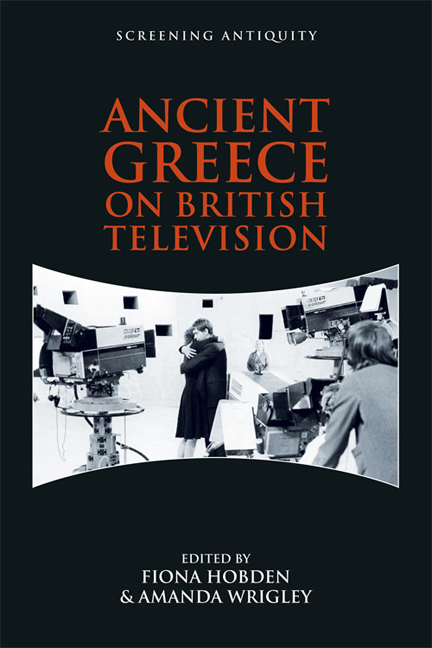Book contents
- Frontmatter
- Contents
- List of Figures and Tables
- Series Editors’ Preface
- Acknowledgements
- Contributors
- Abbreviations
- Broadcasting Greece: An Introduction to Greek Antiquity on the Small Screen
- 1 Are We the Greeks? Understanding Antiquity and Ourselves in Television Documentaries
- 2 Louis MacNeice and ‘The Paragons of Hellas’: Ancient Greece as Radio Propaganda
- 3 The Beginnings of Civilisation: Television Travels to Greece with Mortimer Wheeler and Compton Mackenzie
- 4 Tragedy for Teens: Ancient Greek Tragedy on BBC and ITV Schools Television in the 1960s
- 5 The Serpent Son (1979): A Science Fiction Aesthetic?
- 6 Don Taylor, the ‘Old-Fashioned Populist’? The Theban Plays (1986) and Iphigenia at Aulis (1990): Production Choices and Audience Responses
- 7 The Odyssey in the ‘Broom Cupboard’: Ulysses 31 and Odysseus: The Greatest Hero of Them All on Children’s BBC, 1985–1986
- 8 Greek Myth in the Whoniverse
- 9 The Digital Aesthetic in ‘Atlantis: The Evidence’ (2010)
- 10 Greece in the Making: From Intention to Practicalities in Television Documentaries. A Conversation with Michael Scott and David Wilson
- Bibliography
- Index
Series Editors’ Preface
Published online by Cambridge University Press: 24 April 2021
- Frontmatter
- Contents
- List of Figures and Tables
- Series Editors’ Preface
- Acknowledgements
- Contributors
- Abbreviations
- Broadcasting Greece: An Introduction to Greek Antiquity on the Small Screen
- 1 Are We the Greeks? Understanding Antiquity and Ourselves in Television Documentaries
- 2 Louis MacNeice and ‘The Paragons of Hellas’: Ancient Greece as Radio Propaganda
- 3 The Beginnings of Civilisation: Television Travels to Greece with Mortimer Wheeler and Compton Mackenzie
- 4 Tragedy for Teens: Ancient Greek Tragedy on BBC and ITV Schools Television in the 1960s
- 5 The Serpent Son (1979): A Science Fiction Aesthetic?
- 6 Don Taylor, the ‘Old-Fashioned Populist’? The Theban Plays (1986) and Iphigenia at Aulis (1990): Production Choices and Audience Responses
- 7 The Odyssey in the ‘Broom Cupboard’: Ulysses 31 and Odysseus: The Greatest Hero of Them All on Children’s BBC, 1985–1986
- 8 Greek Myth in the Whoniverse
- 9 The Digital Aesthetic in ‘Atlantis: The Evidence’ (2010)
- 10 Greece in the Making: From Intention to Practicalities in Television Documentaries. A Conversation with Michael Scott and David Wilson
- Bibliography
- Index
Summary
Screening Antiquity is a new series of cutting-edge academic monographs and edited volumes that present exciting and original research on the reception of the ancient world in film and television. It provides an important synergy of the latest international scholarly ideas about the onscreen conception of antiquity in popular culture and is the only book series to focus exclusively on screened representations of the ancient world.
The interactions between cinema, television, and historical representation is a growing field of scholarship and student engagement; many Classics and Ancient History departments in universities worldwide teach cinematic representations of the past as part of their programmes in Reception Studies. Scholars are now questioning how historical films and television series reflect the societies in which they were made, and speculate on how attitudes towards the past have been moulded in the popular imagination by their depiction in the movies. Screening Antiquity explores how these constructions came about and offers scope to analyse how and why the ancient past is filtered through onscreen representations in specific ways. The series highlights exciting and original publications that explore the representation of antiquity onscreen, and that employ modern theoretical and cultural perspectives to examine screened antiquity, including stars and star text, directors and auteurs, cinematography, design and art direction, marketing, fans, and the online presence of the ancient world.
The series aims to present original research focused exclusively on the reception of the ancient world in film and television. In itself this is an exciting and original approach. There is no other book series that engages head-on with both big screen and small screen recreations of the past, yet their integral interactivity is clear to see: film popularity has a major impact on television productions and, for its part, television regularly influences cinema (including film spin-offs of popular television series). This is the first academic series to identify and encourage the holistic interactivity of these two major media institutions, and the first to promote interdisciplinary research in all the fields of Cinema Studies, Media Studies, Classics, and Ancient History.
Screening Antiquity explores the various facets of onscreen creations of the past, exploring the theme from multiple angles.
- Type
- Chapter
- Information
- Ancient Greece on British Television , pp. ix - xPublisher: Edinburgh University PressPrint publication year: 2018

